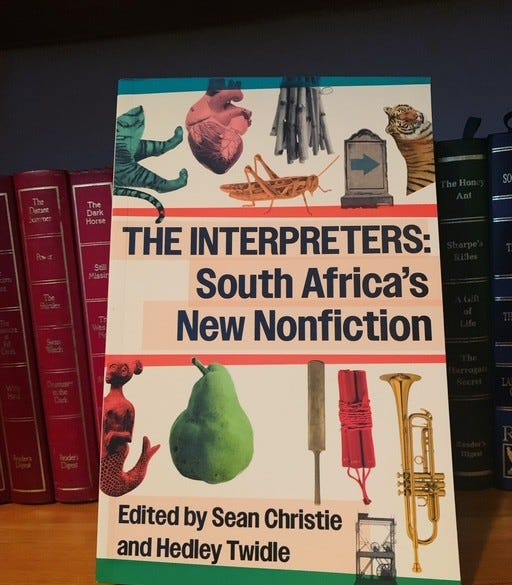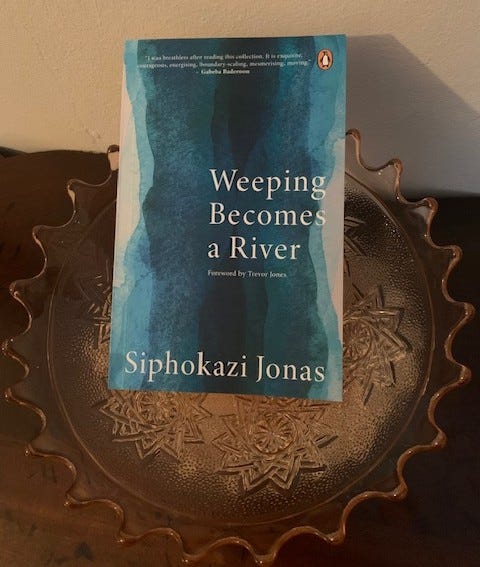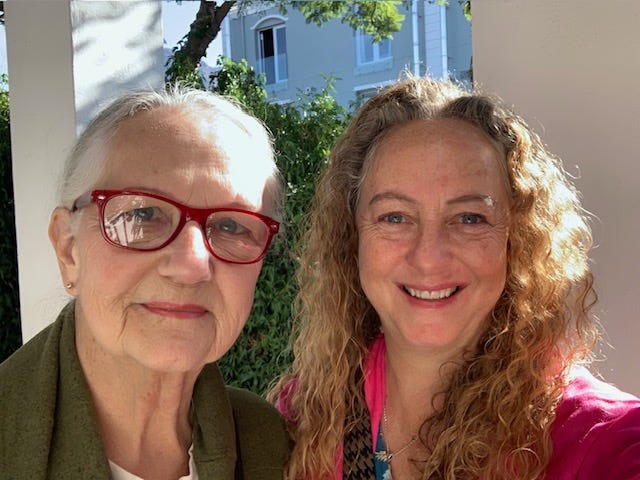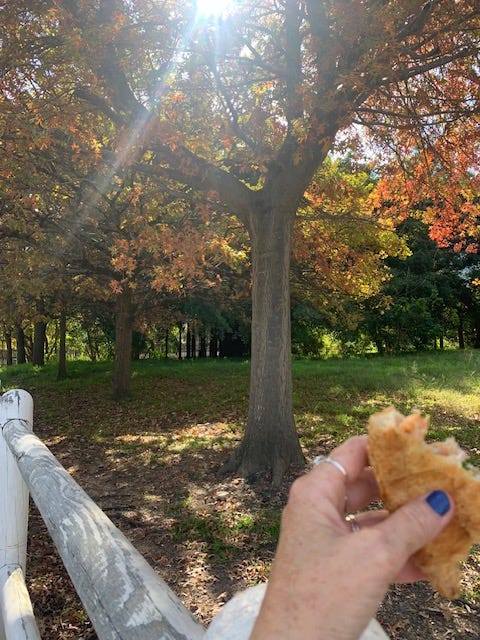Why am I writing this post about the Franschhoek Literary Festival?
I’m trying to make friends with my writing. This is why I’ve started the post with a list, to trick myself into putting words to the page. My pen and I are going through a difficult phase: she feels awkward in my hand, and when she’s not rolling her eyes at me, she’s giving me the side-eye. When I try to make a joke that she’d normally love, there’s just this prickly silence. Even when I rake up old anecdotes: ‘Remember when we…"‘ she just nods distantly and stares out the window.
I’m comparing myself to all the other writers who have posted witty summaries and insightful anecdotes (this one by Hannah Botsis, for example), and if I don’t press Publish, that crappy little voice that whispers ‘Why bother?’ in my head will grow in strength
I have a bunch of new subscribers and, as they are mostly fellow readers & writers, I’m hoping this topic will be of interest to them
I want an excuse to post a blog I wrote six years ago about the Franschhoek Lit Fest, as it (mostly) says everything I want to say now, but with one difference
I’ve just come back from 3 days there with my mum - it’s our annual literary get-away
7 things I’ve learnt from the Franschhoek Literary Festival
by 2019-me, pre-publication of Boiling a Frog Slowly
I’ve attended the Franschhoek Literary Festival ever since I moved down to Cape Town from Johannesburg, ten years ago. Some years it’s been just for a day, other years (depending on the space on my budget) it’s been for the weekend.
This year on our last night, as the full moon drifted across the sky like a great white globe and a Cape Eagle owl watched my mum and I drive up the mountain slope to our little guest cottage, I thought about what I’ve learnt from the FLF.
FOMO
No matter how Zen-like I strive to be, there’s always a healthy dose of FOMO that accompanies me to each talk. There’s a little voice inside me that whispers: Maybe the other talk was more fun. You should’ve booked for the one on…
And so I breathe in and focus on being where I am. It’s perfect.
(And if this doesn’t work, then I tell myself I can always listen to the podcast of the talk I missed out on, which I never do.)
Now I’ve learned to largely let go of this FOMO. I book tickets for the various talks fairly randomly, knowing it’s an impossible choice, and knowing that wherever I land up will be interesting. Because how could it not be?
2. Random is good
The conversations and random encounters between the sessions can be just as much fun as the actual panels. If you’re strong enough to resist booking for each session, and you create space between talks, it adds another layer to your experience. You can simply wander around and see what life throws onto the pavement in front of you.
This is still true. with an extra layer of delight when I run into people who’ve read my book and we have these short but meaningful encounters.
3. Off-topic
The topic listed on the programme almost never gets discussed in full. It simply acts as a kind of overarching reason to get authors and audience into the same space. And then, if you’re lucky, and the panel host is skilled and the authors are in story-telling mode, a stillness descends on the room. The conversation sparks, your eyes may even well up, and magic happens.
Still a big Yes to this. Thinking of the convo this weekend between SA icon, Ian Roberts, (actor, playwright and singer), and interviewer Jenny Crwys-Williams. She threw questions at him and he ran with them. In his raspy voice, he said: Now, Jenny, as an actor doing a fight scene, you’ve got to learn how to buy a punch. He turns in his chair to face her. ‘Here, Jenny, let me throw a punch at you and you jerk back - but you really need to show the audience that you’re buying it. You can’t duck too early. Jenny shakes her head emphatically: ‘Nope, I’m not doing that. Didn’t you break someone’s nose once?’
A bit later, he explains how he dragged himself out of a depression in the years before ‘shrinks and drugs’. ‘I have young men coming up to me now after a show’ he drawls, ‘and the main thing I can tell them is ‘You’re not alone.’ (A Meditation app with only Ian Roberts’s gravelly voice saying: You’re not alone, could do wonders for all of us.)
‘I focus on small things’ and points with his gnarled finger at objects right in front of him: ‘This. This. This. Then the past vanishes and the future becomes the mystery it always was.’
4. Off the beaten track
Take time to step off the main pathways. One of my favourite spots in Franschhoek is the cemetery opposite the church. It’s quiet, the tombstones are inscribed with poignant words, and it puts my dreams and longings in perspective. The proximity of my mortality reminds me to put pen to paper while I can.
Still true, although this time I found a lovely patch of grass and sunlight and a squirrel, its tail a fluffy question mark, interrogating the leaves on the ground.
5. Readers
As a reader, I soak up the joy of hearing the voices of unfamiliar writers, their flashes of quiet humour and self-deprecating anecdotes. And I absorb the authority with which they speak of their creations. They are unapologetic champions for their own stories. And when I get home, and their stories sit on my bedside table (because of course we’re all supporting SA authors and buying their books), I let their voices ring in my ears as I read. It makes their books come alive.
And also, never judge a book by its cover. Went to Hedley Twidle’s talk on the recent nonfiction anthology he’s compiled, The Interpreters. His presentation was a highlight of the festival for me and made a book that hadn’t initially grabbed me, come alive. I can’t wait to read the beautiful pieces in this collection.
Another point is that reading is active, not passive. I attended a convo with Siphokazi Jonas, the poet, whose collection, When Weeping Becomes a River, is about the linguistic and cultural alienation she experienced as a black learner in former Model C schools in the 90s. She interspersed her talk with poems from this collection and they were breath-taking. Before she read one that’s based on Xhosa Iintsombi (folktales) she paused. I sat back, expecting her to translate the Xhosa words she’d used in her intro for the mostly white audience, but she looked across at us and said, I don’t want to translate. Make a black friend and talk to them about this. She explained how she hopes her collection is an invitation for monolinguistic readers to engage actively with the Xhosa in her poems.


6. Writers
As a writer, I gather up shiny nuggets of advice from those on the panels.
I jot each one down. I hoard these stories like little batteries for my torch when I’m having a writing power failure. They light my way back to the page.
Still true.
7. Bums on seats
Those sitting up there on the panels are really no different from us. They are not some chosen few to be revered and envied from a distance. The thing (apart from talent) that has led to them sitting up on those chairs, with ‘Author’ tags dangling from their necks, is mostly showing up at the page. Regularly. Faithfully. No matter what. And that’s how they improve and hone their skills. It’s not magic.
Each year at the FLF, amongst all these insights, I am also shadowed by a future me. The me whose longings have finally come to fruition. The ‘author me’ who is on panels (or at least one panel). Whose works are on the Exclusive Books shelves. Whose tag swings around her neck as she makes her way to the hallowed ground of the Green Room. Who throws her head back and laughs heartily at some writerly witticism, making sure not to spill her wine.
And now, in 2025, that shadowy future me is here. She has had her book published by a publisher she admires. She’s been on panels and her books are on bookshop shelves. (She even got an author discount at Exclusives in Franschhoek!) She still receives beautiful messages about her book from readers. But most of all, she feels part of an incredibly generous and supportive literary community.
Now all she has to do is write her next book!
(With thanks to the storytellers who keep putting pen to paper and showing us what is possible.)





Thanks for the shout out Cathy! So kind of you. And was glad I got to meet you in the flesh at the festival however briefly XXX
Yoh, this is so good. And now I HAVE to go next year. Thanks for the push.